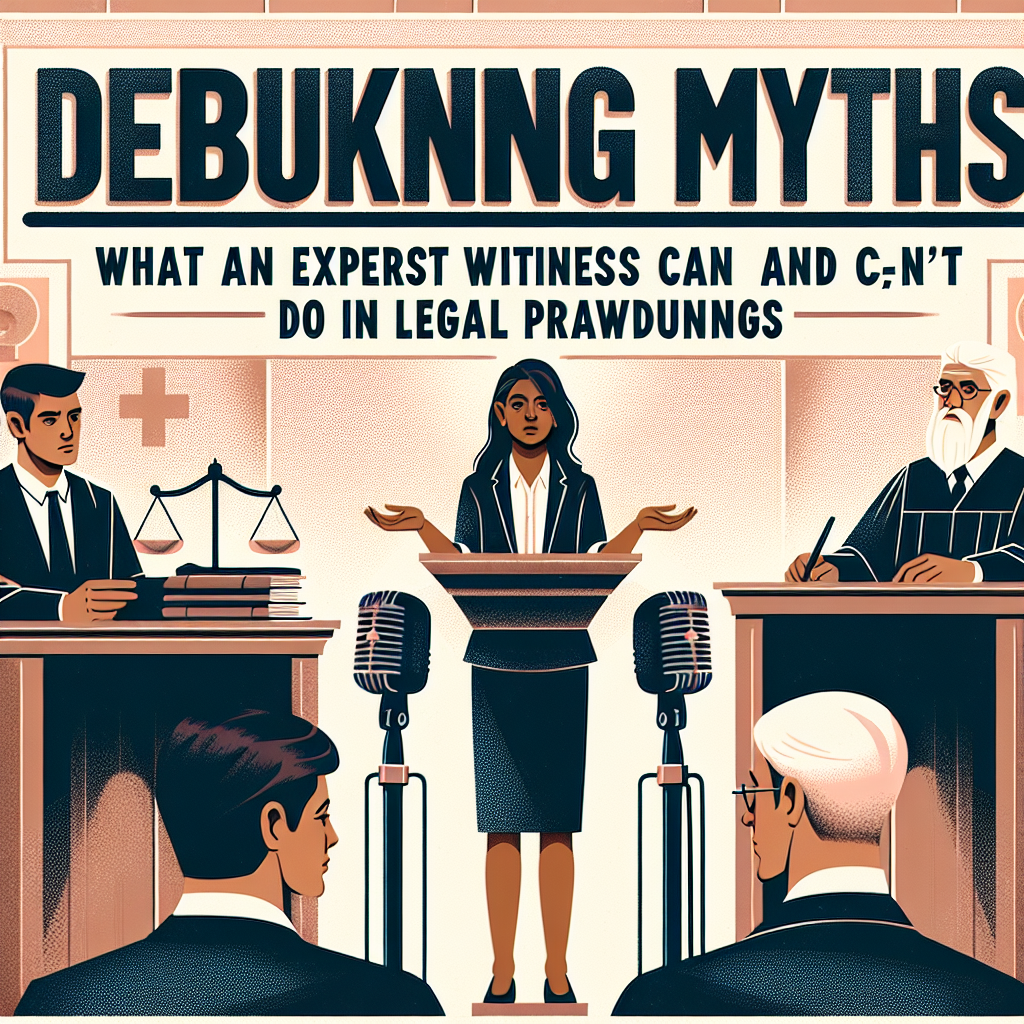
Introduction
In the intricate world of legal proceedings, where every piece of evidence can sway a verdict, the role of an expert witness has garnered significant attention. However, alongside its growing visibility, numerous myths have emerged. Many individuals—lawyers, defendants, and even juries—hold misconceptions about what an expert witness can truly do and where their limitations lie. This article aims to provide clarity and insight into the essential role of expert witnesses by debunking common myths. Understanding these nuances can make a definitive difference in how legal cases are approached and decided.
Myth 1: Expert Witnesses Can Solely Influence the Verdict
Reality: While an expert witness can provide invaluable insights, they do not determine the outcome of a case. Their purpose is to assist the court in understanding complex topics that are outside the knowledge of a layperson.
Case Study: In Daubert v. Merrell Dow Pharmaceuticals, Inc. (1993), the court had to decide whether to admit scientific expert testimony based on the methodology used in the case. Although the expert’s analysis was compelling, it ultimately became a matter for the judges and juries to interpret. This case illustrates that, even with strong expert input, the final decision rests with the jury.
Myth 2: All Expert Witnesses Are Equally Credible
Reality: Not all expert witnesses bring the same level of quality and credibility. Their backgrounds, qualifications, and biases can significantly impact the reliability of their testimony.
Evaluation Metrics: It’s crucial to assess an expert’s qualifications, experience, peer-reviewed publications, and prior court appearances. A table comparing two experts in a hypothetical malpractice case can be helpful here.
| Criteria | Expert A: Dr. Smith | Expert B: Dr. Jones |
|---|---|---|
| Years of Experience | 15 | 10 |
| Peer-Reviewed Articles | 7 | 0 |
| Previous Court Cases | 5 | 15 |
| Education | MD from Harvard | MD from a local college |
In this scenario, despite Dr. Jones’s more extensive courtroom experience, Dr. Smith may be viewed as the more credible expert due to his academic contributions.
Myth 3: Expert Witnesses Can Read Minds or Offer Absolute Certainty
Reality: A common misconception is that expert witnesses can provide definitive answers or predictions. However, expertise does not equate to omniscience. Experts rely on data—often imperfect data—and their analyses are subject to normal scientific limitations.
Case Study: Consider the technology case of KSR International Co. v. Teleflex Inc., where expert witnesses provided conflicting analyses on patent validity. Each expert had based their opinions on different criteria, proving that even experts can disagree and that their conclusions are open to interpretation.
Myth 4: Expert Witnesses Are Just Hired Guns
Reality: While it is true that some experts are paid for their testimony, the implication that all are biased is simply not valid. Many experts strive to maintain objectivity, as their reputations hinge on credibility.
Reputation Management: Experts often aspire to retain a non-partisan reputation, especially in scientific fields. Failing to uphold this could tarnish their careers.
Myth 5: Expert Witnesses Can Determine Guilt or Innocence
Reality: An expert witness cannot decide guilt or innocence; they can only provide specialized knowledge. The triad of law, intention, and circumstance ultimately shapes a verdict.
Analysis: In a notorious case of United States v. Sokolow (1989), an expert witness testified about psychological profiles but did not provide a conclusive statement of guilt. Jury members utilized the expert’s testimony as one piece in a larger puzzle.
Understanding the Role of Expert Witnesses
Definition of an Expert Witness
An expert witness is a professional with specialized knowledge or expertise relevant to a particular case. They are called upon to clarify complex information, allowing judges and juries to make informed decisions.
Types of Expert Witnesses
Forensic Experts: In cases of crime, these experts analyze evidence such as fingerprints, blood, or digital information.
Medical Experts: These professionals provide insight into health-related issues in personal injury and malpractice cases.
Financial Experts: They assess economic damages, often appearing in wrongful termination or fraud cases.
- Technical Experts: Especially relevant in technology and patent law, these experts explain the intricacies of inventions and methodologies.
The Process of Selecting an Expert Witness
Choosing the right expert is crucial for legal proceedings. Below are several steps involved in this selection process:
Gap Analysis: Determine the areas where expert testimony is needed.
Research: Look for experts with a solid track record and relevant experience.
- Interviews: Conduct interviews to gauge communication skills; the expert must clearly explain complex concepts to a lay audience.
Limitations of Expert Witnesses
While expert witnesses can significantly enhance a legal argument, it is also vital to understand their limitations. They do not:
- Render opinions outside their area of expertise.
- Engage in fact-finding duties; this is the role of the court.
- Provide guarantees for case outcomes.
Charts to Illustrate Expert Contributions
A visual representation may enhance understanding. Consider a pie chart showing the weight of various evidence types influencing verdicts:
Legal Evidence Types Influencing Verdicts
| Testimonies: 40% |
| Physical Evidence: 30% |
| Expert Opinions: 20% |
| Other Paperwork: 10% |
Conclusion
Debunking myths about what an expert witness can (and can’t) do is not merely an academic exercise; it’s an essential understanding for anyone involved in legal proceedings. Legal practitioners, juries, and individuals with pending cases need clarity about the expert witness’s role to navigate the complexities of law effectively.
Understanding the limitations and capabilities of expert witnesses paves the way for more informed, balanced decisions based on evidence rather than misinformation. As such, focusing on the right choice and utilization of expert testimony can significantly shift case dynamics.
FAQs
What qualifications should an expert witness have?
- An expert witness should have accredited education, significant experience in their field, and a history of peer-reviewed work.
Can an expert witness be cross-examined?
- Yes, expert witnesses can be subjected to cross-examination to test their credibility, knowledge, and any potential biases.
Are expert witnesses only used in court?
- No, they can also provide consultations outside the court to help build a case prior to formal proceedings.
What if an expert’s opinion conflicts with another’s?
- The jury or judge will weigh the credibility, supporting data, and presentation of both experts before drawing conclusions.
- Can an expert witness have a bias?
- Yes, it is possible, which is why selecting credible experts and scrutinizing their backgrounds and motivations is crucial.
In the high-stakes arena of legal battles, bolstering your understanding of debunking myths: what an expert witness can (and can’t) do in legal proceedings can instill confidence and prepare stakeholders for more effective engagements with the judicial system. Knowledge, as they say, is power.















